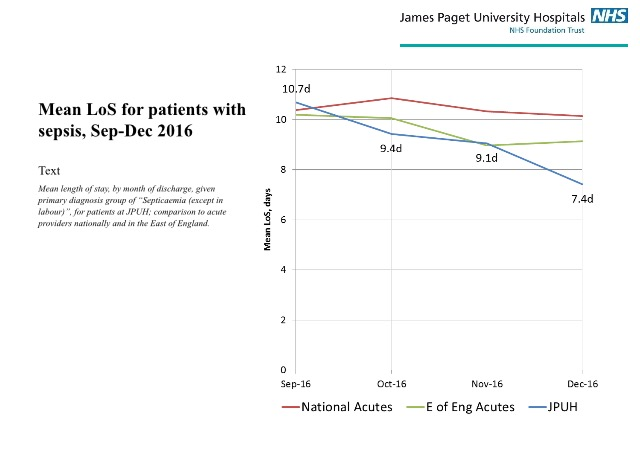Every year in the UK there are 150,000 cases of Sepsis, resulting in a staggering 44,000 deaths – more than bowel, breast and prostate cancer combined.
To reduce mortality, immediate aggressive treatment in the first hour of resuscitation is vital.
 Last April we started a Sepsis project at the James Paget University Hospital with the aim to try to improve Sepsis outcomes at the Trust. For the first three months we did an extensive work engaging with staff and also to evaluate how well we were performing. The trust completed an extensive audit which provided a baseline result and enabled the team to reach a starting point for the improvement project.
Last April we started a Sepsis project at the James Paget University Hospital with the aim to try to improve Sepsis outcomes at the Trust. For the first three months we did an extensive work engaging with staff and also to evaluate how well we were performing. The trust completed an extensive audit which provided a baseline result and enabled the team to reach a starting point for the improvement project.

An extensive process-mapping exercise was completed, looking at current processes and protocols to identify barriers and obstacles that were preventing the trust from achieving the highest standard.
We realised that that the key to succeed was to simplify and make it easy for frontline to identify Sepsis. Since then we have scrapped all paperwork and left with just one simple ticking box form that staff can complete in less than 30 seconds. We have also branded the campaign and made a lot of noise on Social Media.
We have also empowered our specialist Nurses by launching a PGD for them to be able to administer first dose of antibiotics in special circumstances where the doctor is not available immediately.
The Easy guides, prompt cards and Sepsis badges have been a hit with staff and recently I have seen staff getting together and having Sepsis huddles following observations rounds. The message has been very clear and simple. “Does your patient have an Early Warning Score of 3 or above? THINK SEPSIS!!!
After a year of hard work a culture of Sepsis has been embedded amongst the frontline and the results are speaking by itself.
 In 9 months the amount of patients given antibiotics inside the “golden hour” have gone from 63% to nearly 80% overall. We are much better in identifying Sepsis and treating them. As a result our length of stay for septic patients has been reduced dramatically.
In 9 months the amount of patients given antibiotics inside the “golden hour” have gone from 63% to nearly 80% overall. We are much better in identifying Sepsis and treating them. As a result our length of stay for septic patients has been reduced dramatically.The work on the early identification and treatment of sepsis has also had an impact on the crude mortality rate reducing it by nearly 2.5%.

Also the relative risk of mortality and readmission for Sepsis patients has was also well below the expected at the end of December.
Considering that we just had the worse winter in the NHS history, this results are absolutely amazing and all credit to the fabulous staff at the James Paget University Hospital who have embraced the project with open arms.

The feedback from patients also has been amazing.
A year on we can happily said that the James Paget University Hospital is a safer place for patients, relatives and staff.
For further information please contact [email protected]

